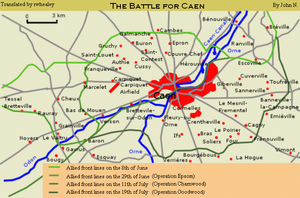Operation Atlantic
| Operation Atlantic | |||||||
|---|---|---|---|---|---|---|---|
| Part of the Battle for Caen | |||||||
 |
|||||||
|
|||||||
| Belligerents | |||||||
|
|
|
||||||
| Commanders and leaders | |||||||
|
|
|
||||||
| Strength | |||||||
| 2 Infantry divisions 1 Armoured Brigade |
2 Panzer divisions | ||||||
| Casualties and losses | |||||||
| 1,349–1,965 | Unknown | ||||||
Operation Atlantic (18–21 July 1944) was a Canadian offensive during the Battle of Normandy in the Second World War. The offensive, launched in conjunction with the British-led Operation Goodwood, was part of an ongoing effort to seize the French city of Caen and vicinity from German forces. It was initially successful, with gains made on the flanks of the Orne River near Saint-André-sur-Orne, but an attack by the 4th and 6th Canadian Infantry Brigades, both part of the 2nd Canadian Infantry Division, against strongly defended German positions on Verrières Ridge resulted in heavy casualties and limited strategic gain.
The capture of the historic Norman town of Caen, while "ambitious", was the most important D-Day objective assigned to British Lieutenant-General John Crocker's I Corps and its component British 3rd Infantry Division, which landed on Sword Beach on 6 June 1944. Operation Overlord plans called for British Second Army to secure the city and form a line from Caumont-l'Éventé to the south-east of Caen, thus acquiring ground for airfields and protecting the left flank of the U.S. First Army, under Lieutenant General Omar N. Bradley, as it moved on Cherbourg. Possession of Caen and its surroundings would give Second Army jumping-off points to attack southwards and capture Falaise, which would in turn act as a pivot for a swing right to advance on Argentan and then the Touques River. The terrain between Caen and Vimont was open, dry and conducive to swift offensive operations. Since the Allied forces greatly outnumbered the Germans in tanks and mobile units, a mobile battle was to their advantage.
...
Wikipedia
